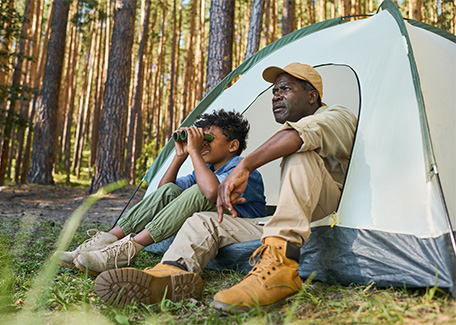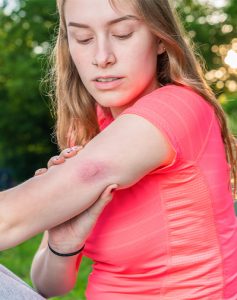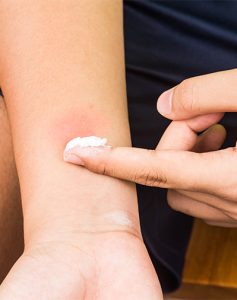By Ashley Figurski, Safety Consulting Manager
 Warm weather is finally here, and it’s time to get outside to enjoy it! You may be preparing for an upcoming vacation or outdoor hobbies such as fishing or hunting. Maybe you’re planning outdoor projects. Suddenly, you encounter ticks, wasps, flies, chiggers, or other types of insects. These unwanted pests can quickly turn a good time into a nightmare due to bites or stings. Knowing how to prevent and treat insect bites and stings can be helpful for outdoor activities.
Warm weather is finally here, and it’s time to get outside to enjoy it! You may be preparing for an upcoming vacation or outdoor hobbies such as fishing or hunting. Maybe you’re planning outdoor projects. Suddenly, you encounter ticks, wasps, flies, chiggers, or other types of insects. These unwanted pests can quickly turn a good time into a nightmare due to bites or stings. Knowing how to prevent and treat insect bites and stings can be helpful for outdoor activities.
Symptoms and Related Diseases
 The most common symptoms of insect bites and stings include redness, mild pain in the area, swelling, itchiness, and maybe some puss. An insect bite occurs when the insect’s mouth touches your skin, such as a mosquito bite. The reaction is due to the insect leaving its saliva in your bloodstream. An insect sting occurs when an insect stings you, releasing toxins into the body and causing the reaction. While it is unlikely, insect bites and stings can spread diseases such as Lyme disease and Spotted Mountain Rocky Fever, which are spread by ticks, and West Nile, which is spread by mosquitoes.
The most common symptoms of insect bites and stings include redness, mild pain in the area, swelling, itchiness, and maybe some puss. An insect bite occurs when the insect’s mouth touches your skin, such as a mosquito bite. The reaction is due to the insect leaving its saliva in your bloodstream. An insect sting occurs when an insect stings you, releasing toxins into the body and causing the reaction. While it is unlikely, insect bites and stings can spread diseases such as Lyme disease and Spotted Mountain Rocky Fever, which are spread by ticks, and West Nile, which is spread by mosquitoes.
Treatment
 Treatment will vary depending on the type of insect that bit or stung you. You may treat most of these insect stings or bites with over-the-counter medications like antihistamines or low-dose steroids such as hydrocortisone. However, a few serious circumstances may require a hospital visit, such as getting bitten by a venomous insect like a brown recluse or black widow spider or developing an infection from a bite or sting. Of course, if you are allergic to a specific insect like bees or wasps, which are common allergies, you should promptly seek professional medical treatment in those instances as well.
Treatment will vary depending on the type of insect that bit or stung you. You may treat most of these insect stings or bites with over-the-counter medications like antihistamines or low-dose steroids such as hydrocortisone. However, a few serious circumstances may require a hospital visit, such as getting bitten by a venomous insect like a brown recluse or black widow spider or developing an infection from a bite or sting. Of course, if you are allergic to a specific insect like bees or wasps, which are common allergies, you should promptly seek professional medical treatment in those instances as well.
Protection and Preparation
 The best way to protect yourself is to avoid contact with these insects. You can do this simply by wearing long-sleeved clothing and long pants while outdoors. Another best practice is to use insect-protecting sprays, such as Permethrin spray for ticks, bug sprays with DEET, or more natural versions containing eucalyptus.
The best way to protect yourself is to avoid contact with these insects. You can do this simply by wearing long-sleeved clothing and long pants while outdoors. Another best practice is to use insect-protecting sprays, such as Permethrin spray for ticks, bug sprays with DEET, or more natural versions containing eucalyptus.
Keep in mind, however, that insects like to hang around standing water. Be sure to remove any collected or stagnant water that you notice around your home or on job sites. Other suggestions to keep insects at bay include putting away leftover food, covering trash, and disposing of garbage at regular intervals.
Knowledge is the cornerstone to defending yourself against these types of pests. Educate yourself on how to properly treat bites and stings by enrolling in a first aid course. RETTEW offers a variety of courses and services, like First Aid, CPR, Bloodborne Pathogens, and AED, which is certified by the American Safety and Health Institute, to ensure you and your staff are prepared. Contact us to learn more about RETTEW’s comprehensive and compliant safety training programs and how classes can be customized to your facility and response plan.
Additional Offerings
Safety training and consulting are only some of RETTEW’s 600-plus services. Our safety team works hand in hand with engineers, scientists, project managers, and other technical experts at places such as manufacturing facilities, drill pads, and commercial construction sites. We are well respected for our work in a diverse number of industries and are known for ensuring workers and equipment remain safe, which keeps your projects on track and your bottom line growing.
